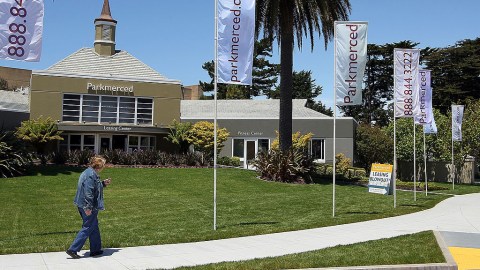San Francisco Explores Transportation Credits to Reduce Parking

The Parkmerced housing development in San Francisco will offer an intriguing new kind of stipend to the people who move into the building. Instead of providing parking spaces for all new residents, a certain portion will receive a $100 credit for Uber or public transit each month if they agree to do one thing — not have a car.
The decision goes along with the city’s vision to shift locals away from driving personal cars in the city, toward other forms of transportation, such as ridesharing, public transit, and biking. The private company in charge of the Parkmerced development, Maximus calls the program “a first-of-its-kind partnership” that could change the way we think about where we live and how we get places.
There’s a lot of good going on here. To help avoid further climate change and pollution, people should probably be taking a lot more public transit. If it’s true that most people in Parkmerced that opt to apply the $100 credit to Uber would use it to get to public transportation (rather than riding Uber all the way to their destination) then that could be a really great thing for sustainability. More people could have better access to transit with a lower input of their own funds.
Given the context of the Bay Area housing crisis and sky-high rents, however, it does seem that this model should be applied to low-income housing developments as well, since low-income residents are even less likely to drive than higher income residents when living near transit. Transit subsidies based in apartment complexes could relieve some of the burden from the households most struggling to pay rent and manage their transportation costs at the same time.
Additionally, since Uber has been “sued dozens of times by city governments and taxi unions,” cities partnering with the company for services might be wary of how to keep it in line with their own interests, especially if greater public transit use is truly the end goal.
All in all, the Parkmerced partnership is certainly innovative, and will be an important project to watch unfold. If effective, cities might just have some new ideas for reducing traffic congestion and increasing public transit ridership.
—
Header Image: Justin Sullivan / Staff





